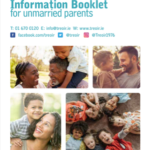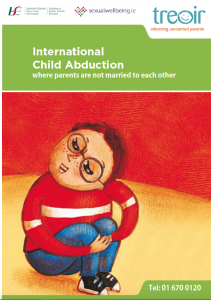Updated: June 2019
International child abduction
Section 16 of the Non-Fatal Offences Against the Person Act 1997 establishes the offence of international child abduction in Irish legislation.
It is an offence for any person including a parent or guardian to take or send a child under 16 years out of the State
(a) in defiance of a court order, or
(b) without the consent of each person who is a guardian, or without the consent of a person to whom custody of the child has been granted by a court, unless the consent of a court was first obtained.
What if the other parent is not a guardian and has refused consent?
If that parent has applied to court for guardianship, and a summons has been served, the child cannot be taken out of the country unless the court grants permission. This applies even though the case has not yet been heard.
What is guardianship?
Guardianship is the collection of rights and duties that a parent, or non-parent, may have in respect of a child. For example, a guardian has a duty to maintain and properly care for the child and has the right to make decisions in the major areas of the child’s life e.g. choice of religion, of school, adoption, consenting to medical treatment, passports, decisions about leaving the country and where the child lives and other matters affecting the welfare of the child
For a parent:
Where a parent has guardianship he/she has the full collection of rights and duties in respect of her/his child.
For a non-parent:
The court will decide what guardianship rights a non-parent, e.g. step-parent, grandparent, will be given. These rights could include all or some of the guardianship rights granted to a parent and may include the right to make decisions about country of residence.
Who is a guardian?
Parents
In Ireland unmarried mothers are automatically guardians of their children. Where a father has his name on his child’s birth certificate this does not mean he has guardianship rights. A father will have guardianship rights if
(a) he signs a statutory declaration for guardianship (S.I. No. 5 of 1998) with
the mother, which is appropriately witnessed, or
(b) A father who is living with the mother continuously for 12 months and at least 3 of these months are after the birth of the child, will automatically be the guardian of his child. The cohabitation period can only be calculated going forward from the commencement date of the Children and Family Relationships Act 2015. This means that guardianship will only be acquired automatically where the parents live together for at least 12 months after the 18th of January 2016, or
(c) the father has got a court order for guardianship.
Non-parents
It is possible for step-parents, certain relatives (including grandparents) and certain other persons to apply to court for guardianship rights. Read ‘who else can become a guardian?’. The court will make its decision in the best interests of the child. The court can decide what guardianship rights to grant; these may include the right to make decisions about ‘country of residence’.
Rules that apply in relation to international child abduction
The rules that apply in relation to international child abduction cases are set out in:
- The Hague Convention on the Civil Aspects of International Child Abduction
- The European Convention on Recognition and Enforcement of Decisions concerning Custody of Children and on Restoration of Custody of Children (Luxembourg Convention)
- The 1996 Hague Convention on State, Applicable Law, Recognition, Enforcement and Co-operation in Respect of Parental Responsibility and Measures for the Protection of Children. The full text of the Convention and further relevant information can be found here
- EC Regulation No. 2201/2003
The Hague Convention on the Civil Aspects of International Child Abduction is the main Convention covering child abduction and this has been signed by over 90 countries, including Ireland. The Hague Convention seeks to protect children from the harmful effects of abduction and retention across international boundaries by providing a procedure to bring about their prompt return. It is based on the principle that the Court of the child’s habitual residence is best placed to decide any custody disputes.
What can I do where there is a perceived threat of abduction?
There are a number of things you can do if you fear that your child may be abducted:
- Contact the Gardaí informing them of the perceived threat
- If you are the legal guardian of your child (or have applied to be a guardian) you may contact the Passport Office and request that you be informed if the other parent applies for a passport for your child
- Apply to the Court requesting that it direct who should hold the passports, e.g. yourself, the GardaÍ, the courts
- The Irish Centre for Parentally Abducted Children* produced a Prevention Pack in which you can record details of your child such as DNA samples, photographs and a description. This could be useful to the authorities in the event of an abduction.
*Please note that this organisation is no longer operating.
What can I do if my child has been abducted?
If your child has been removed from Ireland without your consent to a country which has signed the Hague Convention, you can apply to the Irish Central Authority for Child Abduction or to the Central Authority for Child Abduction in the state to which the child has been removed to request to have your child returned to you. See below for contact details.
All child abduction cases are treated as a matter of urgency. The Central Authority for Child Abduction does not charge for its services.
If a child has been removed to or retained in a country which has not signed up to any of the international conventions contact the Department of Foreign Affairs. Contact details are below.
Will the court order the return of my child?
Under the Hague Convention the court will generally order the return of the child apart from situations where one of the exceptions contained in Article 13 of the Convention applies. These include if it can be shown that the child would be at risk if he/she is returned and appropriate steps have not been taken to remove this risk. If the court is of the opinion that the child is mature enough the court will consult the child before making its decision.
What to do if my child is removed/abducted within Ireland
In a situation where a child is removed/abducted within Ireland contact your local Gardaí. In general, these situations will be dealt with in your local District Court as part of custody/access proceedings.
Useful Addresses
The Central Authority for Child Abduction
Department of Justice and Law Reform
Bishop’s Square, Redmond Hill, Dublin 2
LoCall: 1890 555 509
01 479 0200
E-mail: internationalchildabuduction@justice.ie
www.justice.ie/en/JELR/Pages/International_child_abduction
See list of contact details for all Central Authorities.
Department of Foreign Affairs
80 St Stephen’s Green, Dublin 2
LoCall: 1890 426 700
Telephone: 01 4780822
https://www.dfa.ie
Gardaí
If you believe your child is at risk of abduction contact the Gardaí at your local Garda station.
www.garda.ie
Passport Office
Tel: Dublin – 01 671 1633
Cork – 021 494 4700
www.passport.ie
Reunite
UK charity specialising in international parental child abduction.
www.reunite.org
Action Against Abduction
UK charity set up to fight parental child abduction across frontiers.
www.actionagainstabduction.org
Treoir – National Information Service for Unmarried Parents
28 North Great George’s StreetDublin 1
Telephone: 01 670 0120
E-mail: info@treoir.ie
www.treoir.ie
Download our Information Pack for Unmarried Parents HERE
Download our information leaflet on International Child Abduction HERE
NOTE:
Treoir 2019
While every effort has been made to ensure the information provided in this webpage is accurate, no responsibility can be accepted by Treoir for any error or omission.


